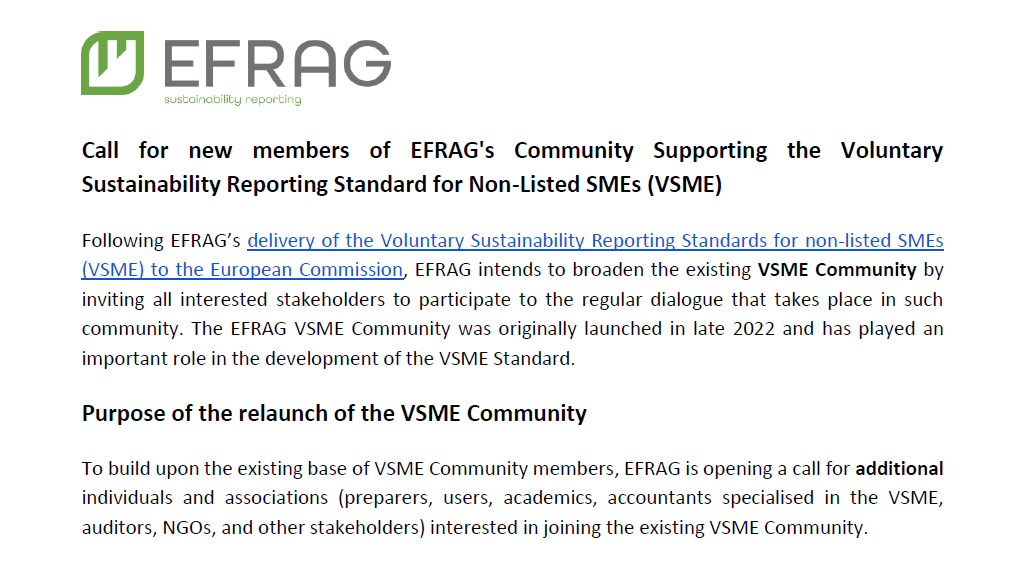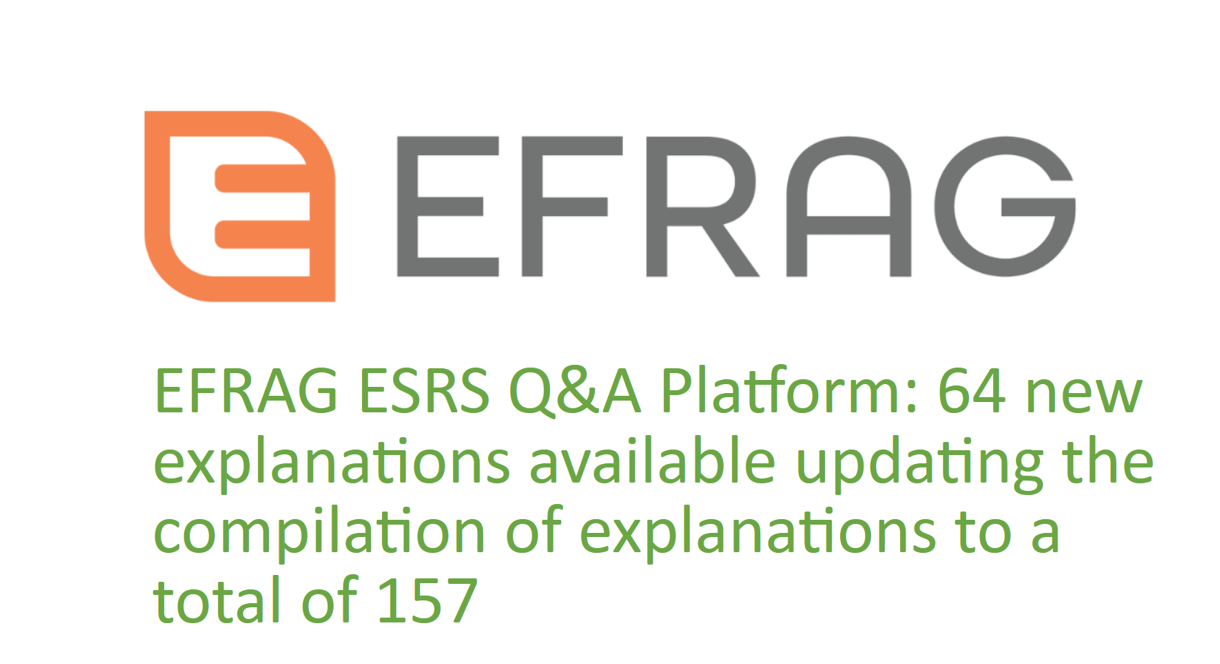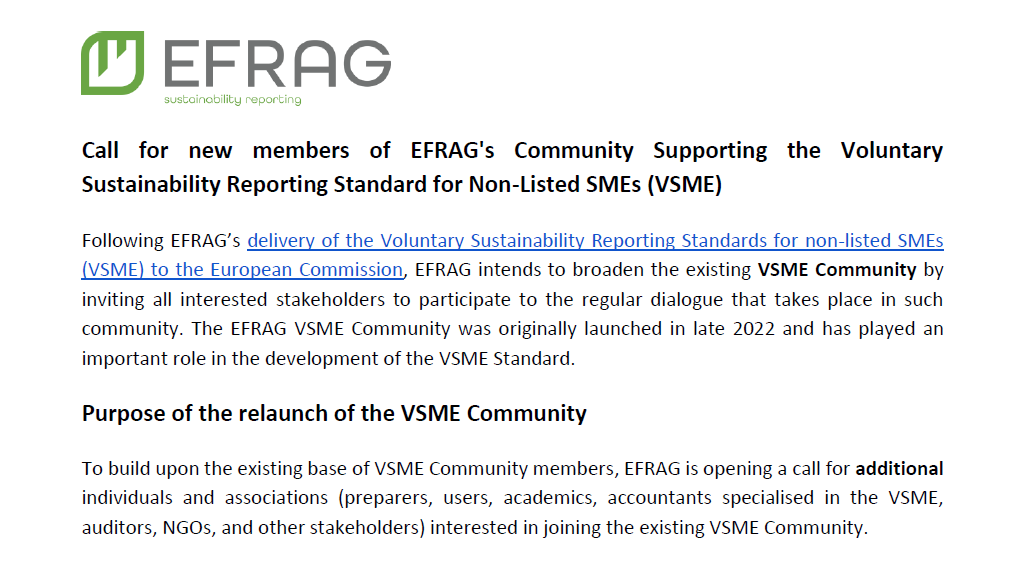EFRAG Expands VSME Community to Strengthen Voluntary Sustainability Reporting for SMEs
EFRAG is expanding its VSME Community, inviting new members to join the discussion on voluntary sustainability reporting for non-listed SMEs. This is a chance for businesses to simplify their reporting, attract investment, and prepare for future regulations. Transparent sustainability practices are becoming a key market advantage, helping SMEs build trust with investors and partners.

EFRAG has launched a new call for participants to join the VSME Community, inviting businesses, experts, and organisations to contribute to the ongoing dialogue on voluntary sustainability reporting for non-listed small and medium-sized enterprises (SMEs). This initiative builds upon the foundation laid in 2022 when the VSME Community was introduced to address the unique challenges SMEs face in sustainability disclosure.
EFRAG welcomes applications from individuals, associations, and organisations involved in SME sustainability reporting, particularly those with expertise in sustainability disclosure, financial analysis, or regulatory frameworks. The deadline for applications is 14 February 2025, and submissions can be made via the dedicated online form.
Further details can be found in the announcement regarding the recruitment of new members to the EFRAG community in support of the voluntary sustainability reporting standard for non-listed SMEs (VSME).
Broadening Participation for Enhanced Framework Development
Following the recent submission of the Voluntary Sustainability Reporting Standards for non-listed SMEs to the European Commission, EFRAG aims to broaden the community to include a wider range of stakeholders. This will ensure the development of a reporting framework that reflects market realities and addresses the practical challenges of sustainability disclosure. Participants will have the opportunity to contribute through surveys and written input, shaping the future direction of the VSME Standard.
The first outreach event is scheduled for March 2025, with additional sessions planned throughout the year. To further assist SMEs, EFRAG is developing resources like reporting templates, digital tools, and examples of best practices tailored to SMEs.
The VSME Community will also collaborate with the newly established EFRAG SME Forum, a platform for institutional representatives involved in the standard’s development. This combined effort will enable a more comprehensive approach to sustainability reporting, with insights from various stakeholders, ensuring that the VSME Standard is both accessible and aligned with the needs of SMEs.
Tackling the Core Challenges of SME Sustainability Reporting
Sustainability reporting presents significant challenges for SMEs, mainly due to limited resources and expertise. Unlike large corporations, SMEs often lack the capacity to navigate evolving ESG regulations and expectations. However, transparency in sustainability practices is increasingly becoming a key factor in maintaining competitiveness. Investors, business partners, and consumers are placing greater importance on sustainability, making it essential for SMEs to adopt clear reporting practices.
The VSME Standard provides a simplified yet flexible framework to help SMEs overcome these challenges. With 99% of businesses in the EU classified as SMEs, the need for a reporting system that aligns with their operational realities is crucial. By joining the VSME Community, businesses and professionals can directly contribute to shaping a reporting framework that balances meaningful ESG disclosures with practical implementation, tailored to the needs of SMEs.
Strategic Benefits of Sustainability Reporting for SMEs
Sustainability reporting is no longer just a compliance requirement — it has become an essential tool for business growth and competitiveness. Businesses that commit to transparent sustainability practices can expect to unlock several strategic benefits.
Access to investment
More than 75% of investors now factor ESG considerations into their investment decisions. By adopting sustainability reporting, SMEs enhance their appeal to investors and financial institutions, which are increasingly prioritising ESG factors. This transparency can help SMEs attract funding and secure more favourable financing terms.
Stronger market positioning
Transparency in sustainability efforts builds trust with customers, suppliers, and business partners. Companies that demonstrate a commitment to responsible practices are more likely to attract new clients and partners, particularly large corporations seeking reliable suppliers with strong ESG credentials. As ESG considerations influence consumer purchasing decisions, SMEs that align with these expectations gain a competitive edge in both domestic and international markets.
Readiness for future regulatory changes
Early adoption of sustainability reporting prepares SMEs for potential future regulatory requirements. By engaging with the VSME Standard now, businesses can avoid the costs associated with last-minute compliance efforts when regulations evolve.
Resilience and risk management
Adopting sustainability reporting helps SMEs identify and address ESG-related risks, such as supply chain disruptions, climate change, and shifting consumer preferences. Integrating sustainability into business practices strengthens resilience and positions SMEs for long-term success in a rapidly changing market.
Attraction of talent
SMEs with strong ESG practices are more likely to attract top talent, especially as younger generations prioritise sustainability in their career choices. By demonstrating a commitment to responsible business practices, SMEs can position themselves as employers of choice in a competitive labour market.
Conclusions
The expansion and support of the VSME Standard are aimed at making sustainability reporting not only accessible but also genuinely beneficial for small and medium-sized enterprises (SMEs). By joining the VSME Community, businesses gain the opportunity to actively participate in shaping a reporting framework that aligns with their specific needs while contributing to the broader EU sustainability goals.
The VSME Standard provides SMEs with a valuable tool for adopting sustainable practices that are both practical and strategically advantageous. Voluntary sustainability reporting enables companies to enhance their market position, attract investment, and strengthen their long-term resilience. The VSME Community plays a key role in this process, offering a collaborative platform for knowledge exchange and cooperation, making sustainability disclosure more accessible, relevant, and effective.


